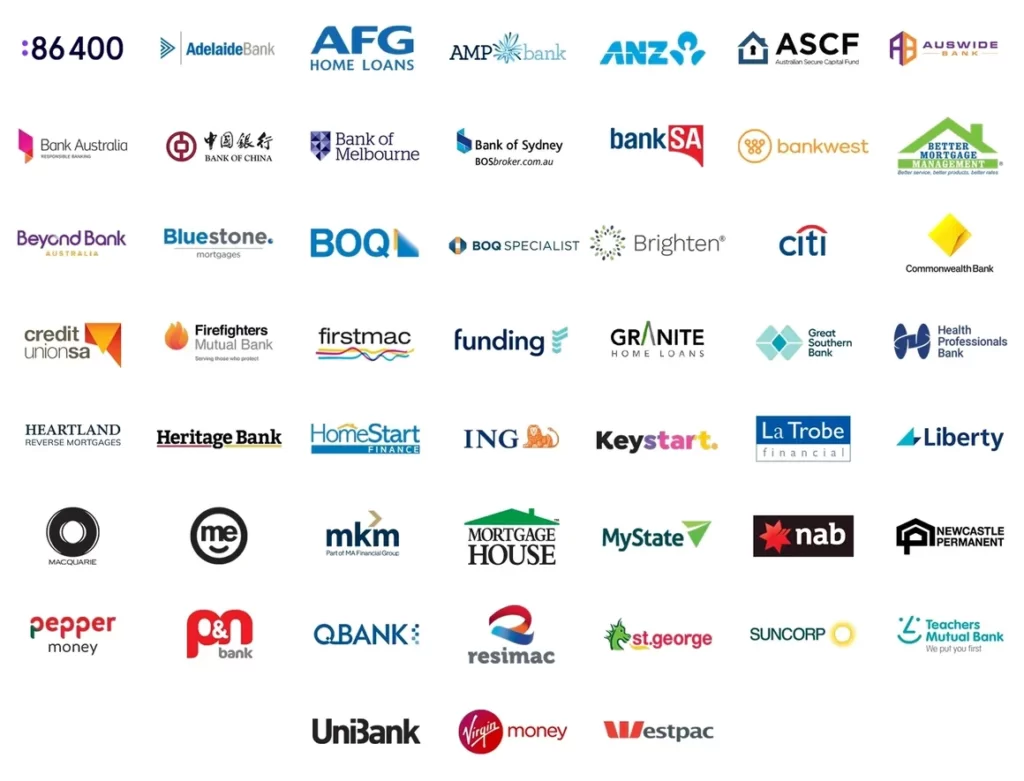Self Employed Home Loan
Home loan secrets for the self employed with guidance and support.

How Many Years of Self-Employment for a Home Loan?
To qualify for a self-employed home loan, most lenders typically mandate at least two to three years of self-employment experience. Nevertheless, some lenders are open to considering individuals who have been self-employed for as little as one year. If you’ve been self-employed for one year or more, connect with us today at 1300 401 847 or complete our free assessment form to explore your mortgage approval options.
Less Than a Year of Self-Employment:
For those with less than one year of self-employment history, the available options are limited. Most banks are hesitant to lend due to the absence of tax returns and the heightened financial uncertainties associated with new businesses. However, one of our lenders can evaluate your previous job’s income as evidence of your loan affordability, enabling you to potentially borrow up to 80% of the property’s value.
One to Two Years of Self-Employment:
If you’ve maintained self-employment for one to two years and possess at least one year’s financial documentation for your new business, one of our lenders can approve your loan application. An ideal example is a plumber who transitioned from employment to entrepreneurship and has operated a plumbing business for one year while accumulating five years of prior employment experience in the same field.
Mistakes Made by Banks:
Banks often make errors when calculating the income of self-employed borrowers. For intricate loans, we maintain detailed records and, if necessary, engage with the assessor to guide them through the financial details to ensure accurate loan assessments. Common bank mistakes include a lack of understanding regarding complex trust structures, double-counting income or expenses, and overlooking the financial benefits of tax-deductible car expenses within a company. To mitigate procrastination in processing complex loans, we liaise with management to assign experienced assessors capable of handling challenging applications effectively.”
How Is My Income Calculated by Lenders?
Lenders often rely on your previous tax returns to gauge the future stability of your business. Significant fluctuations in your income, whether an increase or decrease, over the last two years can trigger caution from both banks and non-bank lenders. Lenders may adopt different approaches in assessing your income:
- One lender may utilize the lowest income figure from the last two years.
- Another may consider the most recent year’s income as per your tax return.
- Some lenders may opt for an average of the two years’ income or use 120% of the lowest year’s income.
- They may choose to add back the expenses indicated in your returns.
In certain cases, lenders may accept six months’ payslips and an accountant’s letter as an alternative to presenting tax returns and financial documentation. The variation among lenders in interpreting your tax returns means that your choice of lender can significantly impact your loan application. It’s essential to work with a lender who will assess your income in the most favorable way for your specific situation. Depending on your circumstances, we may strategically select and present documents to support the highest possible income, such as Business Activity Statements (BAS), an Australian Taxation Office (ATO) tax portal printout, or bank account statements showing your turnover over the last three to six months.
Our expertise lies in finding the lender most inclined to favorably review your documents. Reach out to us at 1300 401 847 or complete our free assessment form, and we’ll help you connect with the right lender for a smooth home buying experience.
Earning Your Own Income?
Thanks to a new policy offered by one of our lenders, you may qualify for a loan based on the following criteria:
- Two payslips OR three months of salary credits along with an accountant’s letter as a substitute.
- All self-salaried income is treated as PAYG.
- Your business must have been operating for over two years, with salary payments for at least three months.
- No need for Notice of Assessments (NOAs), tax returns, or financials.
Lender Perspectives:
Lenders tend to perceive self-employed borrowers as higher risks due to the variable nature of their income. Additionally, some banks may be less favorable toward specific industries, such as construction, as they have observed higher default rates over the years. This leads to a more conservative lending approach, with some mortgage insurers even refusing low doc loans for builders at one point.
How We Can Assist:
We understand that not all self-employed businesses are created equal, and there are many profitable, well-established enterprises across Australia. We are well aware that it’s unfair to generalize them collectively. We can help you identify lenders who take a more favorable stance toward self-employed individuals. For expert advice on your loan, please reach out to us at 1300 401 847 or complete our free assessment form.
How Lenders Review My Tax Returns
When your tax returns land on a bank credit officer’s desk, they follow specific protocols to ensure their validity, including confirming that they are signed, certified, and supported by notices of assessment. These precautions serve as basic fraud checks to verify that the returns match those lodged with the Australian Taxation Office (ATO). Typically, the lender examines your last two years’ taxable incomes, and in some cases, they will add back any exceptional or non-recurring expenses.
Notably, some lenders can consider additional factors like superannuation contributions and depreciation. The key takeaway here is that different lenders may interpret your tax returns differently. Additionally, documentation requirements may vary depending on your business structure, such as company, trust, partnership, or sole trader. The lender may request interim financials or cash flow projections based on your business nature and application risk. For more insights or to discuss your home loan application with our expert mortgage brokers, please contact us at 1300 401 847 or complete our free assessment form.
Freshness of Tax Returns
The timing of your tax returns can influence the documentation requirements when applying for a loan. In general, lenders typically request tax returns for the most recently concluded financial year every March or April. Up until that point, the returns from the previous year will suffice.
For instance, if you applied in January 2021, most lenders would ask for your 2018 and 2019 tax returns. However, in March 2021, they would require the 2019 and 2020 returns. Exceptions do exist, as one of our lenders can make accommodations for older tax returns, which can be beneficial for individuals who have not yet lodged their most recent return.
Another lender streamlines the process, requiring just one year of tax returns. This option proves advantageous for those who experienced a less favorable financial year the preceding year or have recently embarked on a new business venture. If you can’t provide Business Activity Statements (BAS), we can connect you with lenders who don’t insist on them, provided you can present recent tax returns. For instance, if your tax returns for the Fiscal Year 2020/21 are available, BAS may not be required, though BAS criteria remain applicable if 2019 tax returns are the latest on hand.
Understanding “Add Backs”
While your taxable income represents your earnings, it doesn’t fully capture your capacity to meet your financial commitments, including new mortgage repayments. Therefore, lenders incorporate an “add back” process to consider certain expenses that have reduced your taxable income but are not genuine day-to-day expenses or ongoing commitments. Add backs essentially enhance your assessable income and, consequently, your borrowing capacity. Several examples of add backs include:
- Depreciation: Despite being a tax deduction, depreciation is not an everyday expense. Hence, some lenders add it back to your taxable income.
- Asset write-offs: Tax write-offs for assets your business purchased can be added back to your taxable income.
- Additional superannuation: Lump-sum contributions to superannuation that surpass the minimum requirements can also be added back.
- Net Profit Before Tax (NPBT): Profits retained in your company can be taken into account. For shareholders in part ownership, lenders will assess your share of the net profit.
- One-off expenses: Extraordinary expenses can often be added back, although an accountant’s letter may be necessary for confirmation.
- Interest expenses: Lenders take into account the tax-deducted interest paid on business loans or investment loans by assessing each commitment separately in their serviceability calculation.
- Rental property expenses: Add backs encompass depreciation on properties, management fees, repairs, and other rental property deductions, including negative gearing, while rent income is deducted separately.
- Company car: Lenders typically don’t add back car-related expenses, but they may factor in an additional $3,000 to $6,000 in income to compensate for the tax-deducted expenses.
- Trust distributions: In most cases, income distributions from a discretionary trust can be added back, but some lenders may not accept this approach or may require an accountant’s letter to confirm the beneficiaries’ financial independence.
This process can indeed become intricate. As a result, bank employees sometimes make errors in income assessments.
Low Doc Options
Many lenders offer low doc loans that allow you to bypass the submission of tax returns or financials by simply signing a declaration to confirm your income. The lender will then assess your loan using this declared income. While most low doc loans don’t incur higher interest rates, some may charge Lenders Mortgage Insurance (LMI) as a one-off fee when the loan is set up. This fee typically applies to loans exceeding 60% of the property value. For more information, please explore our low doc home loans section or alternative income verification page, or complete our free assessment form. Our mortgage brokers will assist you in finding a suitable lender and a competitive loan package. Connect with us today at 1300 401 847!
A Self-Employed Refinance Case Study | Overview
Summary of the Situation
A comprehensive look at Justin’s scenario, financial details, and objectives.
Client Profile
Introducing Justin, an IT manager with a significant annual income and ambitious real estate plans.
Scenario Description
Exploring the background and objectives of the client’s financial situation.
Client’s Objective
Understanding Justin’s primary goal: refinancing his primary residence and using the cashed-out equity for a new property investment.
Challenges Faced
Highlighting the key obstacles and complexities in Justin’s financial situation.
Loan Details
A breakdown of the loan structure, amounts, and terms involved in this case.
Loan-to-Value Ratio (LVR) and Term
Details about the Loan-to-Value Ratio (LVR) and the loan term.
Income Information
Insight into Justin’s annual income, a critical aspect of the case.
Proposed Solution
An overview of the suggested financial solution to address the client’s needs.
Outcome and Result
Discover the successful outcome of Justin’s financial journey, including how he accessed $125,000 for his property investment.
For personalized assistance with your financial goals, don’t hesitate to reach out to us.
Steer Clear of Business Banking
When it comes to borrowing within a company, trust, or partnership structure, the last thing you want is to be referred to business banking. It’s crucial to avoid this route.
The key point to remember is that if you’re offering a residential property as collateral, there’s no reason you should be subjected to higher interest rates and increased fees just because your loan is under a business entity. From a lender’s perspective, the risk level remains the same as it would be for a standard mortgage.
The good news is that some of our trusted lenders are willing to approve loans within company structures or trusts at the standard residential rates. While there may be slightly elevated fees, these are primarily associated with the preparation of more comprehensive loan documents that often include a personal guarantee from the company’s directors.
To find out more or begin your loan application, please don’t hesitate to reach out to us today at 1300 889 743 or complete our free assessment form. We’re here to assist you in obtaining the loan approval you need.
Take the First Step: Apply for a Home Loan
If you’re a self-employed individual seeking financial assistance, we’re here to help! However, it’s essential to consider applying for a home or investment loan when you feel confident about the stability of your business.
This is a critical aspect that both we and the bank can’t directly evaluate, so you’ll need to assess it for yourself. Get in touch with us at 1300 401 847 or fill out our free assessment form to receive a tailored quote from a lender that aligns perfectly with your unique situation.
Related Topics
Why Choose Clear Pacific Capital?
Our Services
Our Approach to Finding the Ideal Solution for You
We begin by gaining a comprehensive understanding of your current circumstances and your long-term objectives. Our process is designed to provide you with a tailored recommendation, and it's as simple as following these few steps:
1
Start by filling out our free assessment form or giving us a call.
2
Our team will carefully evaluate your unique financial situation.
3
We thoroughly examine the various options available through our network of trusted lenders.
4
The end result? We'll pinpoint the most fitting and advantageous home loan offers for you.
Clients Love
Testimonial
Highly recommended. Irfan is an incredibly knowledgeable and professional broker. Irfan was able to help us every step of the way in our journey to buying our first home.






